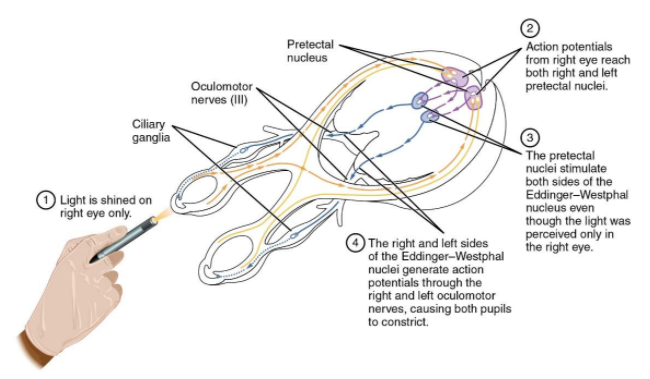
What is the role of the brain in reflex action?
Answer
591.3k+ views
Hint: Reflex action is defined as an automatic response of the body to a stimulus. Eg., withdrawal of hand, knee jerk etc. It is under the control of the spinal cord. It is regulated through a reflex arc.
Complete answer:
Reflex action: The reflex action is an automatic response of the body to a stimulus which reduces any damage to the body from potentially harmful conditions. Eg., withdrawal of the hand, knee, jerk etc.
Reflex arc: The pathway taken by nerve impulses in a reflex action is the reflex arc. This allows the brain to record the event and remember it for future use.
The brain is not involved in a reflex action as it is an involuntary action that does not require thinking. For instance, when we touch a hot object, we immediately withdraw our hand without thinking.
An action potential not sent to the brain for processing despite, sensory neurons synapse in the spinal cord that allows reflex actions to occur faster by activating spinal motor neurons, although the brain receives sensory input while the reflex action occurs.

Mechanism of Reflex action: When a sensory receptor receives a stimulus, it is activated and passes signals from it to the spinal cord. The message progresses from the spinal cord along a motor neuron to the effector organ (e.g., a muscle or a gland), which shows the response. Such a pathway is called a reflex arc.
Note:
The reflex action is an automatic response of the body towards a stimulus. Reflex arc allows the brain to record the event and remember it for future use.
Types of action:
Voluntary action: means it is under the control of a person. Eg., writing
Involuntary action: means it is not under the control of a person. Eg., heartbeat.
Complete answer:
Reflex action: The reflex action is an automatic response of the body to a stimulus which reduces any damage to the body from potentially harmful conditions. Eg., withdrawal of the hand, knee, jerk etc.
Reflex arc: The pathway taken by nerve impulses in a reflex action is the reflex arc. This allows the brain to record the event and remember it for future use.
The brain is not involved in a reflex action as it is an involuntary action that does not require thinking. For instance, when we touch a hot object, we immediately withdraw our hand without thinking.
An action potential not sent to the brain for processing despite, sensory neurons synapse in the spinal cord that allows reflex actions to occur faster by activating spinal motor neurons, although the brain receives sensory input while the reflex action occurs.

Mechanism of Reflex action: When a sensory receptor receives a stimulus, it is activated and passes signals from it to the spinal cord. The message progresses from the spinal cord along a motor neuron to the effector organ (e.g., a muscle or a gland), which shows the response. Such a pathway is called a reflex arc.
Note:
The reflex action is an automatic response of the body towards a stimulus. Reflex arc allows the brain to record the event and remember it for future use.
Types of action:
Voluntary action: means it is under the control of a person. Eg., writing
Involuntary action: means it is not under the control of a person. Eg., heartbeat.
Recently Updated Pages
Master Class 11 Computer Science: Engaging Questions & Answers for Success

Master Class 11 Business Studies: Engaging Questions & Answers for Success

Master Class 11 Economics: Engaging Questions & Answers for Success

Master Class 11 English: Engaging Questions & Answers for Success

Master Class 11 Maths: Engaging Questions & Answers for Success

Master Class 11 Biology: Engaging Questions & Answers for Success

Trending doubts
One Metric ton is equal to kg A 10000 B 1000 C 100 class 11 physics CBSE

There are 720 permutations of the digits 1 2 3 4 5 class 11 maths CBSE

Discuss the various forms of bacteria class 11 biology CBSE

Draw a diagram of a plant cell and label at least eight class 11 biology CBSE

State the laws of reflection of light

10 examples of friction in our daily life




